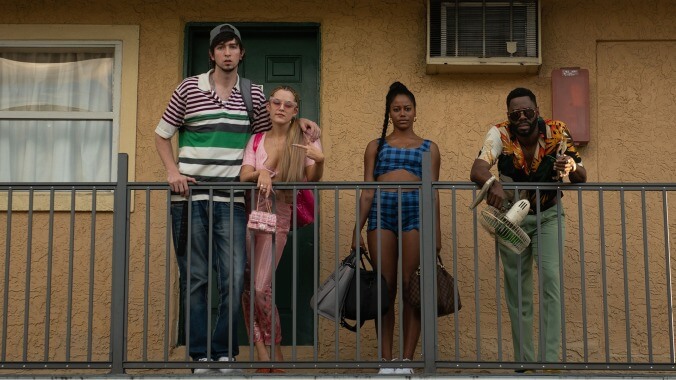Shakespeare could only wish for a cast like Zola’s
Taylour Paige, Riley Keough, Colman Domingo, and Nicholas Braun discuss how they brought the words of a modern-day Bard to life
Image: Photo: A24
In promotion of A’Ziah “Zola” King’s The Story, the hardbound print edition of the Twitter thread that inspired Zola, A24 includes the author in the company of undisputed greats like Homer, John Milton, and William Shakespeare. As anyone who followed along with @_zolarmoon’s 2015 account of a Florida “hoe trip” gone awry would agree, that’s no winking hyperbole. Like The Bard, King is an exceedingly clever wordsmith (introducing phrases like “lost in the sauce” and “pussy is worth thousands” to the lexicon) and a keen observer, a storyteller who can spin gold out of the everyday and the overlooked. And like all three of those literary forebears, King’s work has now been the subject of adaptation and interpretation by other artists: Director Janicza Bravo, her co-writer Jeremy O. Harris, and a skilled troupe of actors all breathing life into King’s chronicle of that fateful road trip in Zola.
At Zola’s core is Zola, of course, played with a perpetual side-eye by Ma Rainey’s Black Bottom’s Taylour Paige. It’s an undeniable breakout role for the actor, her presence a magnetic anchor as things spin deeper into madness—in watching her process what unfolds around her, the film offers up a brilliant meta-commentary on the art of storytelling. But Paige’s performance wouldn’t function the same way without Riley Keough’s Stefani (and vice versa), the yang to her yin. As Zola’s guide on this dark odyssey, Stefani is persuasive, vivacious, and the walking personification of cultural appropriation. It’s a brazen role for Keough, who’s proven herself a fearless chameleon of indie cinema, and one that’s sure to inspire many a think piece. In conversation with The A.V. Club, Paige and Keough discuss how they approached their inextricable dual performances and the instantaneous chemistry that made it all possible.
Taylour Paige: I couldn’t have done it without [Riley]. I think that the challenge, at first, was [that] naturally her energy is so high that I wanted to match it. And Janicza was really, really clear about wanting—you know, Riley’s character is the buffoon, she’s in blackface the whole film, and Zola is the straight man. Just like Lucy and Ethel, it’s a reciprocated effort where I have to have something to react to, but if we’re both too high, I don’t think it would land. So, for me, I think I was an engaged observer.
The A.V. Club: Yes, there’s so much that we get from just the quick glances that you make—
TP: And the deep sighs, yeah.
Riley Keough: Yeah, and she is sort of like the whole audience being like, what? [Laughs.] Like, how everyone’s feeling is Zola, you know?
AVC: So, Riley, how did you play off of what Taylour was bringing—how did you calibrate your performance to that?
RK: I mean, I think our natural chemistry and our friendship was really helpful, in that we were very comfortable with each other and able to play around, ask each other things, and try things. Having that space to be able to play and perform is a luxury—it doesn’t happen often. And I think that is because all of us got along really well, we all were on the same page. We were all kind of able to have fun with this content—even the darker stuff—and there was this [feeling] that we all just loved being there.
From the moment we got there, I really felt that everybody was so grateful to be in this film, we were so excited. And even the ones of us who had been more jaded—you kind of can get jaded and go, like, “Okay, I’m going to work.” And it’s so frustrating because it’s actually the most fun job ever. And with [Zola], I felt all of us were just like, “I’m so happy to be here.” And I think that that environment created this fun [atmosphere,] almost like a theater camp or something like that.








![HBO teases new Euphoria, Larry David, and much more in 2026 sizzle reel [Updated]](https://img.pastemagazine.com/wp-content/avuploads/2025/12/12100344/MixCollage-12-Dec-2025-09-56-AM-9137.jpg)































